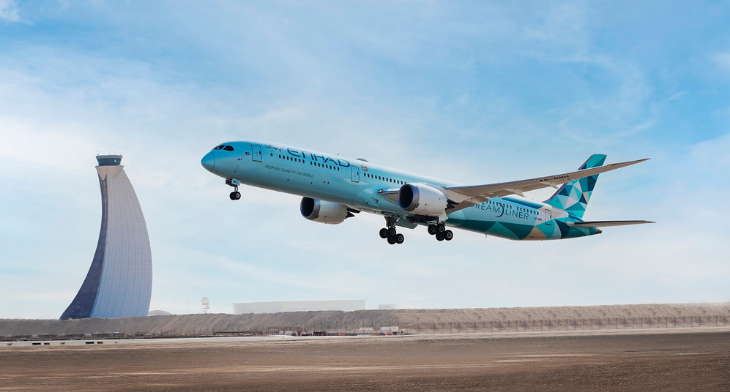
Etihad Airways has operated its first ecoFlight for 2021, continuing research and testing under the Etihad Greenliner programme to assess environmental sustainability initiatives during scheduled services.
This is Etihad’s fourth ecoFlight, operated on the airline’s signature Greenliner aircraft which is fully offset for all operations through 2021 as part of the airline’s mission toward carbon neutral flying.
The maiden 2021 ecoFlight tested a range of flight and engine optimisation initiatives, as well as onboard product enhancements to reduce weight and single-use plastics, with successful trials to be incorporated into regular scheduled operations.
On board, the trial focused on three key pillars: sustainable products, incorporating initiatives identified on past ecoFlights to reduce single-use plastics, and an overall weight reduction study.
The ecoFlight saw the removal and replacement of 1,731 single-use plastic items from onboard service, with a weight reduction of 108 kg, saving 60 kg CO2 emissions. This follows efforts on the first ecoFlight in 2019, where 43 single-use plastic items were removed from onboard operations, resulting in an annual saving of 17 tonnes of waste from landfill and again in 2020, when the airline operated an ecoFlight removing 2,639 single-use plastic items from the flight, equal to approximately 8.8 kg in weight reduction.
Feasible initiatives trialled on the latest ecoFlight will be adapted for standard operations moving forward, contributing to Etihad’s goal to remove 80% of single-use plastics. Based on circular theory efforts, the airline tackled international waste regulations head on with a recycling initiative to better manage cabin waste. Strict waste regulations force international airlines to incinerate all contaminated materials, and efforts were made to identify suppliers offering products that will not release harmful emissions in incineration, such as EcoWare bagasse pots, which are compostable and made from plants. The flight produced and successfully diverted 8.1 kg of recyclable material from landfill.
Boasting a range of sustainable suppliers, the flight focused on avoiding single use items, finding replacements that are locally produced, UAE sourced and meet the requirement of being lightweight and non-energy intensive in the cleaning process or non-impactful in the disposal process.
The ecoFlight showcased Al Ain Water’s sustainable plant-based water bottles onboard. It also featured Abu Dhabi based startup ‘The Concept’s’ sustainable in-flight meal trays made from used water bottles, and BambuuBrush, for their highly sustainable up-cycled Bamboo Toothbrush.
Adding valuable testing data to operational efficiency initiatives such as potable water optimization favours these trials greatly, with this ecoFlight reducing CO2 emissions by 189 kg from this practice alone. The results from the flight will help develop a more efficient method to calculate potable water requirements for future operations, with a potential annual impact of up to 800 tonnes of fuel, or 2,500 tonnes of CO2 saved across the entire fleet.





